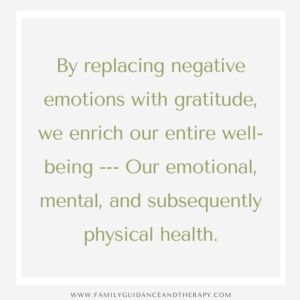When we engage in gratitude practices we amplify our lives, but how does that happen? It starts with understanding the immense value of gratitude.
What is Gratitude?
Gratitude can be described in many ways, but it typically is narrowed down to two areas of thankfulness. First is self-awareness and the acknowledgment of the positive things in life. Second is recognizing that the source of goodness in our lives does not come from ourselves, and therefore we are grateful to other people and to the world that surrounds us.
Gratitude is described by researchers as, “The appreciation of what is valuable and meaningful to oneself and represents a general state of thankfulness and/or appreciation.” (Sansone & Sansone, 2010)
The Proven Psychology of Gratitude
Many studies have found that people who practice gratitude tend to be happier and less depressed, but there is much more credit that can be given to the benefits of living a mindful life of gratitude.
Todd Kashdan, public speaker, and professor of psychology at George Mason University completed an immense number of studies on the topic of gratitude. He identifies gratitude as a top element essential for creating happiness and meaning in life, “Feeling grateful has been associated with less frequent negative emotions and thoughts, more frequent positive emotions and thoughts, greater meaning in life, more positive coping, greater appreciation of life, and even better sleep and exercise.”
How Practicing Gratitude Can Amplify Your Life
Imagine trying to feel depressed, unhappy, frustrated, or overwhelmed, while at the same time your overall mindset is focused on gratitude. It is like combining oil and water, and one ingredient always presides over the other. When we choose gratitude, it becomes the reigning component.
The practice of gratitude rests in affirming the good things in our lives, and it is also rooted in acknowledging the positive role that others play in our lives.
You might also be interested in: The Power of Positivity
When we practice gratitude it:
Enriches Our Well-Being
When we adopt the practice of gratitude, we shed ourselves of toxic emotions.
We let go of emotions such as discontent, dissatisfaction, envy, frustration, and jealousy, which decreases the likelihood that we will experience stress, anxiety, or depression.
By replacing negative emotions with gratitude, we enrich our entire well-being—our emotional, mental, and subsequently physical health.
Helps Us Form Deeper Relationships
The social effects that result from feeling and showing gratitude are monumental to forming deeper relationships.
When we recognize that we are grateful for people, and we have an awareness of what they add to our lives, we become more responsive, and it helps us to identify those that are more responsive to us. It motivates us to participate in and build stronger relationships.
We stop taking people for granted when we practice gratitude.
The goodness that we see in others is magnified when we pay attention.
We stop expecting others to give us what we need, instead, we appreciate that they are simply in our lives.
Improves Our Self-Control
When we focus on gratitude, we cultivate a sense of awareness which improves our level of patience and anxiety. This helps us to live in the moment and to realize that when we wait for the good things and make better choices, such as refraining from acting or speaking out emotionally, we reap the benefits.
Gratitude bolsters our ability to reciprocate the good things in life that come from others, and it gives us the self-control to do so in much more meaningful ways.
Boosts Our Mental and Physical Health
The adoption of gratitude creates biological change.
When we change how we think, our body responds by reducing stress hormones that manage our nervous system functions. In turn, we feel less anxiety. We then feel better mentally and physically with lowered blood pressure and less chance of developing chronic health conditions.
Gratitude is like a gift that keeps on giving. We feel better mentally, therefore we feel better physically, and vice versa.
Tip to Develop Gratitude - Journaling
There are many ways to work on gratitude, but one of the best self-therapeutic ways is to journal.
Journal once a day, twice a day, or carry a journal with you wherever you go.
Be as specific as possible when you write. Write freely, but ensure you foster gratitude. Speak your mind on paper. Let it out!
We all have days when we are looking for things to be grateful for. Try drumming up gratitude ‘in reverse’. This involves reflecting and writing about what your life would be like without certain things in it (i.e., a person, physical surroundings, work, etc.).
Related: Staying Soft of Heart
Gratitude Growth Can Take Time
Be patient with yourself. If you are working on practicing gratitude, you may not notice mental health or other benefits right away. It may take weeks, or even months, but know you are headed in the right direction.
We also want you to know that you don’t have to ‘go it alone.’ You may need to engage in self-care, and that might mean reaching out for help.
We want to help! Make an appointment today.

